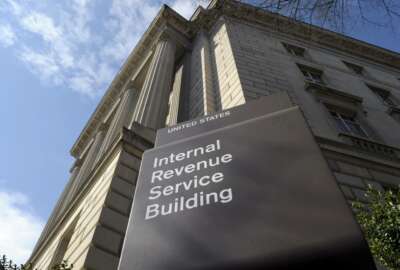Bipartisan infrastructure bill would end a pandemic credit for small businesses
The bill would end the Employee Retention Credit Program, one of several credits Congress created earlier in the pandemic to help small businesses, with the change...
Best listening experience is on Chrome, Firefox or Safari. Subscribe to Federal Drive’s daily audio interviews on Apple Podcasts or PodcastOne.
The bipartisan infrastructure bill that’s expected to be considered by the House soon could set up a huge challenge for the IRS. The bill would end the Employee Retention Credit Program, one of several credits Congress created earlier in the pandemic to help small businesses. It’s a complicated undertaking and since the change would take effect on Sept. 30, the IRS would have almost no time to prepare. Chad Hooper is executive director of the Professional Managers Association. He joined Federal Drive with Tom Temin to talk about what his members think is an impending emergency for the agency.
Interview transcript:
Jared Serbu: And Chad, I think we’d like to start with are there particular challenges related to the employee retention credit program that makes it especially problematic to handle mid year? Or is it more the cumulative effect of everything the IRS has had to deal with related to the pandemic?
Chad Hooper: Thank you so much, Jared. I think that the challenge that the IRS faces whenever there is a mid year, tax law change usually plays out in the same way. This has happened a handful of times in the past, I think we did famously to last year when the IRS began issuing stimulus payments. That was itself a mid year tax change, and it takes the IRS some time to pull people off of work, they have to reprogram their systems, they have to develop new guidance for taxpayers, they have to develop an implement training for the workforce, in this particular change. This will require modifying taxpayer forms and instructions, and then doing quite a bit of outreach and education. What’s unfortunate about the timing of this particular change, terminating the ERC, as proposed, beginning on October 1 is that the House isn’t really scheduled to come back until the 20th of September. And even if they took this bill up right away, and it became law within a few days, that only gives small businesses about a week before they would need to change decisions that they’ve made around staffing. And so when there when when there is a tight turnaround. The other spillover is that business owners tax preparers and payroll service providers need to get in touch with the IRS. And I think that it’s pretty well documented in the press that the IRS is level of service for customer services and exactly where we would want it to be right now. And so giving the public another reason to drive an additional 10 or 15 million calls at this time of the year really is very unhelpful. We’re also in a pickle on our budget, right? The government’s fiscal year ends at the end of September. So there will be questions about what funding there is for staffing, what funding there is for resources, as the Congress waits to the 11th hour to decide whether or how it will appropriate funds for the IRS’ Fiscal 22.
Jared Serbu: Right. And when it comes to a change like this, how much of it is a technology problem and how much of it is a customer service problem, like you were just alluding to?
Chad Hooper: I would love to be able to say that it’s 5050. But the IRS is aging technology, this challenging, the computer system that underlies the business database will turn 60 years old next year. And there are only a handful of people who are skilled, or still have the skills to program in that computer language when the programming takes place. And significant testing has to be done. Unfortunately, also about 60 or so IRS created programs feed into or overlay that database. All of those are aging as well. The IRS is actually also struggling with modernizing a lot of those systems to be compatible with modern web browsers, which is the thing I can’t believe that I’m saying about our government. But it’s the truth. And so a lot of the work will be it related and won’t just be that usual story about the IRS, Beijing database. This affects dozens of systems within the IRS, and as far as Customer service is concerned, will be a major source of confusion. This is a tax credit that is meant to help businesses keep people employed during the pandemic and has been the law of the land since March of 2020. So these are dollars that businesses have come to count on to some extent. And we are concerned about how we will educate the taxpayer base how they will react and what that means for taxpayers citizens and our country’s stability. Although PMA isn’t a small business advocacy group, right, our members, IRS leaders, want to be able to provide the best service that we can and these sorts of changes keep us from being able to do that.
Jared Serbu: I guess fundamentally there are lots of reasons why in a perfect world you wouldn’t want to be making mid year tax changes for broader economic reasons, not just because of management difficulty reasons. But there’s going to be times forever probably where it’s just going to be necessary for one emergency reason or another. Fundamentally what needs to happen to get IRS into a place where it can be nimble enough to handle something like this?
Chad Hooper: Well, we were hoping to get there. In the original text of this bill, until only a few days before the Senate vote, the IRS was appropriated about $40 billion over a decade in order to undertake major modernization projects. It’s an investment every IRS commissioner has been insisting we make since the 90s. And that specific amount of money was requested specifically by our commissioner in testimony even earlier this year. And so when the Congress made the decision to remove that funding from the bill, then they had to find ways to pay for it. And those pay-fors have sort of amounted to gimmicks, like the termination of this credit is one, right. The ERC is funded really out of national debt, right. It’s a a historic pandemic, the Congress is trying to stabilize the economy. So by taking the dollars away from the employer retention credit to give to infrastructure, it’s sort of just redefining what part of the national debt will be spent in which way. The $40 billion IRS investment was going to generate real actual new revenue to the government, which would cause it to not borrow to the extent it will now. In fact, I believe the entire bill is paid by borrowing now.
Jared Serbu: So kind of to summarize everything you just said, what this might end up creating is a real short term problem for IRS, while the same bill actually helps matters in the long run. Is that about fair?
Chad Hooper: I would say yes. There are about 10 provisions of the bill that add burden to the IRS. The employer retention credit for us is a big emergency because it is such a narrow window of time to implement, execute, and have in place. The other areas of the bill that cause significant burden on the IRS, such as Senator Portman inserting the language to create a brand new reporting framework and mechanisms for digital assets or cryptocurrency is quite an expensive assignment for the IRS to receive with $0 of funding to even implement it. So the IRS will then be faced cutting from other areas of its operating budget in order to make that happen over the next year and a half. There’s also no guarantee what kind of money that will bring in, it has to do with the behavior of people selling digital currency is when that becomes a taxable event. So I do think that the ERC is a short term problem that the IRS as always will find a way. The infrastructure bill does contain a lot of other provisions that the IRS has aging infrastructure will struggle to implement, they will find a way to do that. But I don’t believe that we should be trying to get our duct tape and MacGyvering together America’s tech system. We could make a small investment, not pay for this out of national debt and have a world class tax apparatus that can give the American public the service it deserves.
Jared Serbu: Isn’t that part of the problem, though, is that Congress has seen you guys duct tape over the problems so many times in the past, and the system really hasn’t completely crashed and burned. I would think that would tend to lead to an attitude of hasn’t been a problem yet, let’s try this again.
Chad Hooper: I sometimes ask myself, the same question. Is the IRS his ability to see itself through these sorts of crises, what’s perpetuated this, the age of the database and the lack of this investment? There was a time when the IRS was at the forefront of technology, we began computing in the 50s. And we implemented these systems seven or eight years before we went to the moon. The IRS was always at the forefront of technology. It wasn’t until the mid 80s, when the Reagan administration brought along with them an antipathy toward the civil service and government bureaucracy that we started to see the Congress sort of scale back its investment in the IRS. And then we have spent the 90s sort of walking through ways in which IRS enforcement was abusive or unfair to certain kinds of taxpayers, and the Congress to address that through a restructuring act that the IRS has never been able to fully implement, because as soon as that was passed in 1998, the Congress stopped making historic investments in the service. And so now what we have, although for me, 1998 doesn’t feel like it was as many years ago as it is, but we have more than a generation now of taxpayers who’ve grown up with flagging sort of the tax system, and we can’t have this go on for generations. Eventually, the big break will happen. We saw a sneak peek of what the future will bring a few years ago. I think it was in 2018. The IRS is main computing database, had a faulty sensor and believed it was overheating. And so on the filing deadline, the entire system went down. And it took the IRS a day or a day and a half or so to get that back up and running. And the Commissioner of Internal Revenue had to grant a one time extension for taxpayers who were unable to file electronically that day. That’s scary. That has never happened in the history of the Internal Revenue Service, that the tax filing season needs to be extended because of an IT failure. For us, we think that that will be more of the same. There’s also an issue we face in recruiting world class talent to the IRS, because you can see when you walk through an office, the government investment and what kind of tools you’re using, and to take someone off the street and sit them in front of a computer that’s several generations older using a browser that only 1% of America is using. the difficulties of just getting your work done during the day, make the IRS very inefficient. And it can be better an investment that we think is important, but each day that the Congress ignores the issue, it becomes a more expensive problem. So at this time, the IRS spends roughly a quarter of its operating budget simply maintaining all of these legacy systems and as a taxpayer, I don’t want us spending money that way.
Copyright © 2025 Federal News Network. All rights reserved. This website is not intended for users located within the European Economic Area.
Tom Temin is host of the Federal Drive and has been providing insight on federal technology and management issues for more than 30 years.
Follow @tteminWFED






